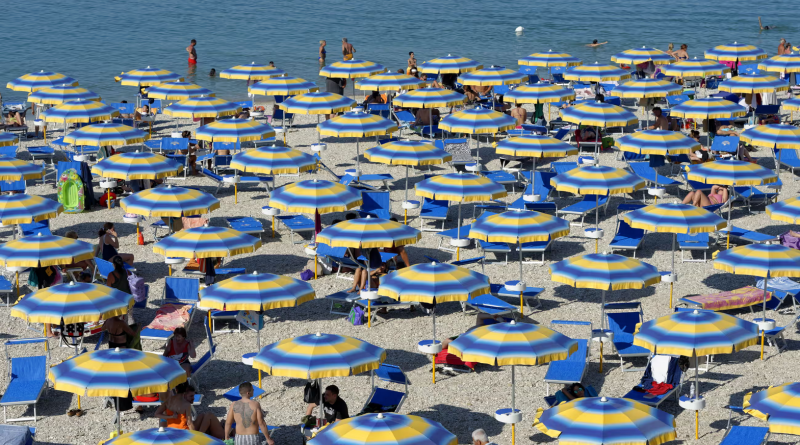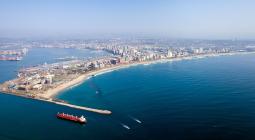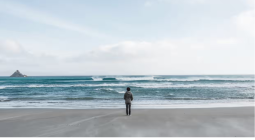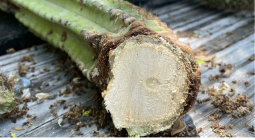‘The Adriatic is becoming tropical’: Italian fishers struggle to adapt to warm sea

Beach parasols at Madonna del Ponte on the Adriatic coast near Fano. Photograph: imageBROKER/Shutterstock
Almost every morning, Daniele Montini and his wife, Alfreda, take a stroll in the shallow waters of the Adriatic Sea. The ritual, followed by many residents in Fano, a coastal town in Italy’s central Marche region, is advised by doctors to stimulate blood circulation and maintain a healthy respiratory system through breathing in the salty air.
It is 7.30am and the outside temperature is already a muggy 29C. The couple, who were born in Fano, know that their summers, and their winters, are being transformed by global heating. What they are not quite used to is the stagnant, much warmer sea.
On a number of days in July, the sea temperature along Italy’s Adriatic coastline, which stretches from Trieste in the north to Capo d’Otranto in the south, reached a record 30C, and in some areas slightly surpassed that figure.
“The water feels very hot, almost like a bath,” said Daniele as the couple finished their walk. “A lot has changed in 50 years. I remember the sea was a lot wavier, now it’s mostly flat.” Alfreda added: “The quantity of the fish has changed too, and the species, some don’t even exist any more.”
Moreover, the sea’s heat and weak currents have contributed to this summer’s widespread proliferation, especially in the northern and central areas of the Adriatic, of mucillagine, or mucilage, a thick, slimy white-yellow substance formed of various microalgae that accumulates on the seabed or the surface.
The mucilage is relatively unique to the Adriatic on the Italian side, and tends to amass more when the sea is not receiving enough nutrients from the Po, the country’s longest river, which stretches from the Alps before spilling into the Adriatic in the north. The last time the substance made such a significant appearance was in 1989, especially in the waters off the coastal towns in the Emilia-Romagna region, causing beachgoers to flee.
But while the mucilage is an unsightly annoyance for bathers, it is not dangerous to their health. It is, however, detrimental for fishing.
Speaking at Fano port late at night after returning from two days at sea, fisher Alessandro Ciavaglia said the mucilage “is everywhere”.
“It causes problems for the boat’s engine, but also blocks off fishing nets, and once this happens it is impossible to fish,” he said. While most types of fish can escape the mucilage, it can suffocate shellfish such as clams, which are also under threat from the blue crabs thriving in the warmer Adriatic, particularly in the northern parts.
Ciavaglia has been a fisher in the Adriatic for 40 years and said he has never experienced such a high sea temperature, and as a result, so much mucilage.
“We’re talking 30C even out in the open sea,” he added. “The Adriatic is becoming tropical. We are starting to see species of fish that were not previously there, such as swordfish, whereas various types of white fish, such as turbot, are almost extinct. There is no doubt that the [climatic] change is happening and it’s pointless trying to deny it.”
Ciavaglia is managing to get by, but smaller independent fishers further up the coast in places such as Pesaro, as well as neighbouring Cattolica in Emilia-Romagna, are faring much worse.
Anna Franchini, who represents a co-operative for small fishers, said: “Fishers here have not been able to work for a month. It’s really sad to see activity so reduced, and there is a lot of anger, also because of the high costs and heavy bureaucracy that people have to deal with at the same time.”
Andrea Bacchiani, a fisher in Cattolica since 1996, said: “Each day is different, but once the mucilage affects the nets you just can’t do anything. In the past, it might have been a problem for a day or two, but not like this, for more than a month.”
Luca Cavallieri, who works in Pesaro, managed to get a decent overnight catch, which is sold fresh at the port by his mother, Stefania. But business has been a struggle. “The temperature is increasingly high, and the sea increasingly warm. I have never experienced it as tough as this before,” he said. “My biggest worry is not having the money coming in to pay people, to pay the mortgage.
Fishing associations in the regions most affected, including Veneto, Emilia-Romagna, Marche and Abruzzo, have urged the government to declare a state of emergency, which essentially gives it power to quickly push through policies that would help to sustain the fishers. The Adriatic – which is part of the Mediterranean – and the seas arounds Sicily are Italy’s biggest producers of fish.
“There is activity all along the coast,” said Tonino Giardini, a coordinator for Gruppo Pesca, a fishers’ co-operative in Fano. “Right now, the biggest challenge is surviving.”
The first sighting of mucilage in the Adriatic was officially recorded in the early decades of the 17th century. “It is a phenomenon closely linked to the climatic conditions and which in recent times reappeared in a very significant way since 1989,” said Maria Lucia De Nicolò, a historian at the University of Bologna and expert on the Mediterranean. “We are in an alarming [phase] right now, but there have always been warnings about climatic changes, and not for nothing.”
There was some hope on Thursday when tests showed the sea temperature had cooled to about 28C.
“But we’re not out of danger, as we have not yet reached the peak temperature, which is usually around mid-August,” said Roberto Danovaro, a marine biologist at the University of Ancona.
Danovaro added that while the Adriatic has become much cleaner over the last 20 to 30 years, it has also become more depleted. “It produces less, and receives less nutrients [from the rivers], and then it suffers from these heatwaves. We are experiencing an anomalous situation and it is starting to become more evident,” he said, pointing to the killing off of sea sponges and other organisms.
“The Adriatic is becoming as tropical as the Maldives, but without the same colour.”





